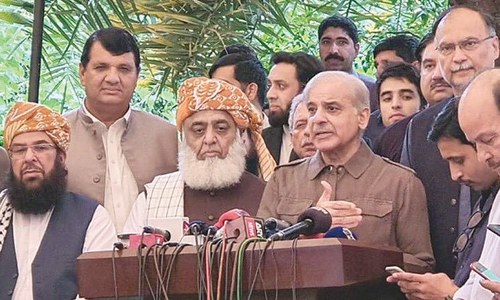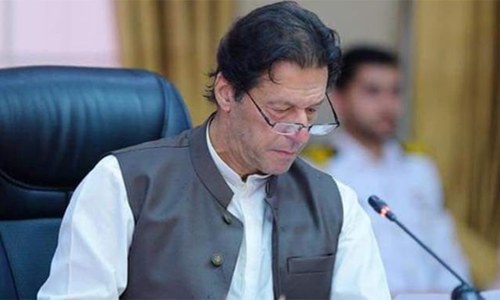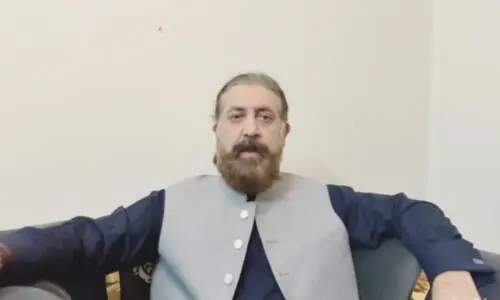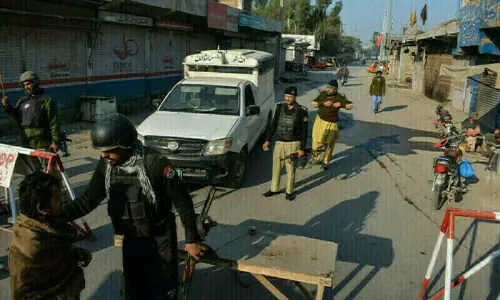ISLAMABAD: Prime Minister Imran Khan claimed on Friday he was not worried about the ‘Azadi March’ — planned to be organised by the Jamiat Ulema-i-Islam later this month — and said the JUI-F was incapable of sustaining a sit-in for even a week.
At a meeting with Ulema and scholars affiliated to government-run institutions or those holding various official positions, the prime minister said he was not under any pressure when it came to Maulana Fazlur Rehman’s proposed march on Islamabad.
The scholars who attended the meeting included members of the Council of Islamic Ideology (CII), Muttahida Ulema Board, Punjab, and Central Ruet-i-Hilal Committee. They belonged to the four mainstream sects of the country.
“This meeting is not for seeking your support over the protest march of [JUI-F chief] Maulana Fazlur Rehman,” Mr Khan said on the occasion. “I have seen many protests and even led a massive dharna of 126 days.”
He said the main purpose behind the meeting was to discuss the “true nature of the state of Madina”.
“I want to make Pakistan a truly welfare state, modelled on the state of Madina; this is the purpose of my life. I am not using the name of Islam for political gains, like former rulers,” said Mr Khan.
He said the scholars had a key role to play in forging unity and harmony in the country, especially over the problems being faced by the nation today.
The premier said he was determined to take the guidance of religious scholars and called for their cooperation so that the government could achieve its goals.
He praised the role played by the seminaries in spreading literacy even in the remote parts of the country and within vulnerable sections of society.
“There is a need to reform the education system and the curriculum; the cooperation and support of clerics in this regard is absolutely essential,” Mr Khan said.
He also took the scholars into confidence regarding his visits to Iran and Saudi Arabia.
Expressing confidence about positive outcomes of his visits, Mr Khan said: “We want to build bridges and end tensions between the two Muslim countries.”
Talking to Dawn, a member of a seminary board said the PM largely refrained from discussing the ‘Azadi March’ but some government functionaries suggested that seminaries were educational institutions and their students or teachers should not take part in such activities.
“However, it has already been decided by all the seminary boards that they cannot get involved in any kind of street agitation or political activities during teaching hours,” he said.
“This is the reason why Jamia Hafsa continues to be delisted by Wafaqul Madaris al-Arabia, the board of seminaries affiliated to the Deobandi school of thought,” he added.
Those present at the meeting included Foreign Minister Shah Mehmood Qureshi, Defence Minister Pervez Khattak, Education Minister Shafqat Mehmood, Minister for Religious Affairs Pir Noor-ul-Haq Qadri, Special Assistant to the PM Naeem-ul-Haq, Special Assistant to the PM on Information Dr Firdous Ashiq Awan and Special Assistant to the PM Yousuf Beg Mirza.
Those in attendance from the side of the clerics included Mufti Muneeb-ur-Rehman, chairman of the Central Ruet-i-Hilal Committee, Dr Qibla Ayaz, chairman of the CII, Allama Arif Wahidi and Maulana Hafiz Tahir Ashrafi.
Some of the Ulema praised the prime minister for what they called the bold stance he took on issues faced by Muslims across the world during his speech at the United Nations General Assembly.
Published in Dawn, October 19th, 2019




































